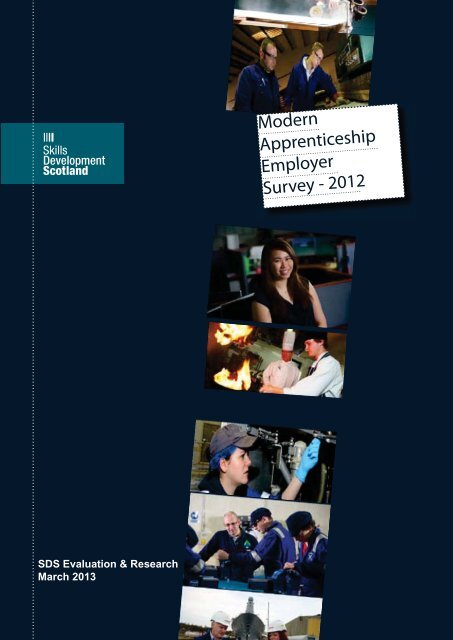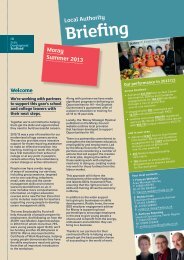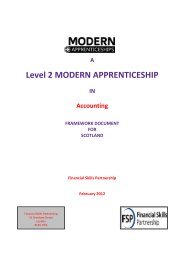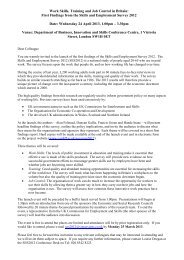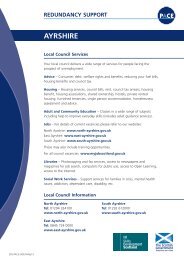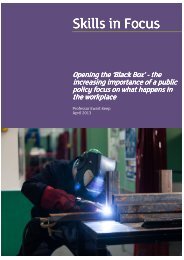Modern Apprenticeship Survey of Employers 2013 (pdf) - Skills ...
Modern Apprenticeship Survey of Employers 2013 (pdf) - Skills ...
Modern Apprenticeship Survey of Employers 2013 (pdf) - Skills ...
Create successful ePaper yourself
Turn your PDF publications into a flip-book with our unique Google optimized e-Paper software.
<strong>Modern</strong><br />
<strong>Apprenticeship</strong><br />
Employer <strong>Survey</strong><br />
2012<br />
<strong>Modern</strong><br />
<strong>Apprenticeship</strong><br />
Employer<br />
<strong>Survey</strong> - 2012<br />
SDS Evaluation & Research<br />
March <strong>2013</strong>
<strong>Modern</strong> <strong>Apprenticeship</strong><br />
2012 <strong>Survey</strong> <strong>of</strong> <strong>Employers</strong><br />
Acknowledgements<br />
We would like to acknowledge the assistance <strong>of</strong> Dr. Vicki Belt from the UKCES in providing<br />
access to the Scottish employer information from the 2012 UKCES Employer Perspectives<br />
<strong>Survey</strong>. This allowed us to incorporate information on Scottish employers who did not<br />
participate in the <strong>Modern</strong> <strong>Apprenticeship</strong> programme.<br />
This report is based upon independent research conducted by IFF Ltd. Every care has been taken to<br />
ensure that this report provides an accurate representation <strong>of</strong> that research.<br />
1 MA Employer <strong>Survey</strong> 2012 FINAL
Contents<br />
1. Executive Summary ................................................................................................................. 3<br />
2. Introduction ............................................................................................................................ 6<br />
3. Pr<strong>of</strong>ile <strong>of</strong> <strong>Employers</strong> Offering MAs ......................................................................................... 8<br />
4. Involvement with MAs .......................................................................................................... 10<br />
5. Motivations for Participation ................................................................................................ 12<br />
6. Use and Views <strong>of</strong> the Programme ........................................................................................ 15<br />
7. Benefits <strong>of</strong> Offering MAs ....................................................................................................... 21<br />
8. Views on Reasons for Non‐Completion ................................................................................ 23<br />
9. Future Plans and Intentions .................................................................................................. 25<br />
Annex A – Pr<strong>of</strong>ile <strong>of</strong> <strong>Survey</strong> Respondents ...................................................................................... 27<br />
Annex B – Employer Satisfaction/Dissatisfaction ‐ Reasons .......................................................... 29<br />
Annex C – The <strong>Modern</strong> <strong>Apprenticeship</strong> Programme in Scotland ................................................... 30<br />
Annex D – Non‐participating <strong>Employers</strong> ........................................................................................ 31<br />
2 MA Employer <strong>Survey</strong> 2012 FINAL
1. Executive Summary<br />
This report is designed to explore employers’ use and views <strong>of</strong> <strong>Modern</strong> <strong>Apprenticeship</strong>s and to<br />
assess the benefits and impact that MAs bring to employers. It is based upon the analysis <strong>of</strong> a<br />
telephone survey <strong>of</strong> 2,500 employers who had an employee leave a <strong>Modern</strong> <strong>Apprenticeship</strong> in<br />
the last three years at the time <strong>of</strong> the survey.<br />
The research was conducted by an independent market research company, IFF Ltd, for <strong>Skills</strong><br />
Development Scotland (SDS) in the latter part <strong>of</strong> 2012. The results presented have been<br />
reweighted to ensure that they are representative <strong>of</strong> <strong>Modern</strong> Apprentice employers as a whole.<br />
The research forms part <strong>of</strong> a wider SDS programme <strong>of</strong> work to inform the delivery <strong>of</strong> <strong>Modern</strong><br />
<strong>Apprenticeship</strong>s in Scotland.<br />
To obtain the views <strong>of</strong> employers who do not <strong>of</strong>fer MAs, a separate analysis was also<br />
commissioned, drawing on findings from the UK Commission for Employment and <strong>Skills</strong><br />
Employer Perspectives <strong>Survey</strong> 1 . The results from this analysis are also presented in this report<br />
(Annex D).<br />
A more detailed review <strong>of</strong> MAs in Scotland will be published later in <strong>2013</strong>. This will include key<br />
insights into the MA programme to drive action and inform the wide range <strong>of</strong> partners involved<br />
drawing from both the <strong>Modern</strong> <strong>Apprenticeship</strong> Outcomes 2012 report 2 and from this survey.<br />
Key Results<br />
Overall the headline results show:<br />
Benefits <strong>of</strong> <strong>of</strong>fering MAs<br />
<br />
<br />
<br />
96 per cent <strong>of</strong> employers reported that completers were better able to do their job as a<br />
result <strong>of</strong> the MA, and 92 per cent reported they were better able to work with others as a<br />
result <strong>of</strong> their MA.<br />
68 per cent <strong>of</strong> employers reported improved productivity, 67 per cent reported improved<br />
product or service quality, and 66 per cent reported improved staff morale as a result <strong>of</strong><br />
<strong>of</strong>fering MAs<br />
Skill improvements were higher across the board for completers compared to noncompleters.<br />
1 UK Commission’s employer perspectives survey 2012 (Evidence report 79) Available at<br />
http://www.researchonline.org.uk/sds/search/download.do?ref=B29091<br />
2 <strong>Skills</strong> Development Scotland (<strong>2013</strong>) <strong>Modern</strong> <strong>Apprenticeship</strong> Outcomes 2012, January <strong>2013</strong><br />
http://www.researchonline.org.uk/sds/search/download.do?ref=B29740<br />
3 MA Employer <strong>Survey</strong> 2012 FINAL
Use and Views <strong>of</strong> the Programme<br />
<br />
<br />
<br />
<br />
<br />
Overall 85 percent <strong>of</strong> employers were satisfied with the relevance <strong>of</strong> the training. 63 per<br />
cent <strong>of</strong> employers reported that they were very satisfied with the relevance <strong>of</strong> the training,<br />
with a further 22 per cent satisfied. Only 5 per cent were dissatisfied with this.<br />
Overall 83 per cent <strong>of</strong> employers were satisfied with the quality <strong>of</strong> training delivered by the<br />
provider. 66 per cent <strong>of</strong> employers reported that they were very satisfied with the quality <strong>of</strong><br />
training, with a further 17 per cent satisfied. Only 6 per cent <strong>of</strong> employers were dissatisfied<br />
with this.<br />
Satisfaction with the MA programme differed by the framework assigned to the employer.<br />
Overall the percentage <strong>of</strong> employers who were very satisfied considerably exceeded the<br />
percentage dissatisfied across all elements and frameworks.<br />
76 per cent <strong>of</strong> employers <strong>of</strong>fered on‐the‐job training and 76 per cent also <strong>of</strong>fered <strong>of</strong>f‐the‐job<br />
training as part <strong>of</strong> the MA. Overall 92 per cent <strong>of</strong> all employers use a training provider to<br />
deliver training for an MA.<br />
Over half <strong>of</strong> employers (56 per cent) reported that they would take on no MAs at all if the<br />
public sector contribution were cut, and a further 17 per cent would take on fewer MAs.<br />
Pr<strong>of</strong>ile <strong>of</strong> <strong>Employers</strong> Offering MAs<br />
<br />
<br />
The vast majority <strong>of</strong> employers responding to the survey were small companies with fewer<br />
than 99 employees. Most employers who responded to the survey (65 per cent) were very<br />
small with between 1 and 24 employees. A further 24 per cent employed between 25 and 99<br />
employees.<br />
The sector with the largest number <strong>of</strong> responding employers was Construction (27 per cent<br />
<strong>of</strong> employers who responded were in the construction sector)<br />
Involvement With MAs<br />
<br />
<br />
75 per cent <strong>of</strong> employers view MAs as important to their business – 53 per cent <strong>of</strong><br />
employers viewed MAs as vital to their business, with a further 22 per cent viewing them as<br />
important.<br />
36 per cent <strong>of</strong> employers had <strong>of</strong>fered MAs for more than ten years and a further 19 per cent<br />
had <strong>of</strong>fered MAs for between 5 and 10 years. <strong>Employers</strong> who participate in the MA<br />
programme are more likely to recruit young people than those that do not.<br />
Motivations for Participation<br />
<br />
<br />
The most common method by which employers first became aware <strong>of</strong> MAs was through<br />
approach by a training provider<br />
The most common reasons employers gave for being involved in MAs was to improve the<br />
pr<strong>of</strong>iciency <strong>of</strong> staff in their job (88 per cent <strong>of</strong> employers) and to ensure that staff could be<br />
trained in their way <strong>of</strong> doing things (88 per cent <strong>of</strong> employers).<br />
58 per cent <strong>of</strong> employers recruited MAs specifically for the training position and a further 13<br />
per cent recruited both specifically and from existing staff – in other words 71 per cent <strong>of</strong><br />
employers recruit MAs specifically either all or some <strong>of</strong> the time. Over a quarter (27 per<br />
cent) <strong>of</strong> employers recruit MAs solely from existing staff.<br />
<br />
Of those employers who always or sometimes recruit MAs specifically, 86 per cent started<br />
MAs straight away or within three months <strong>of</strong> recruitment.<br />
4 MA Employer <strong>Survey</strong> 2012 FINAL
Non‐completion<br />
<br />
<br />
Overall, 37 per cent <strong>of</strong> employers had experienced at least one MA not complete their<br />
apprenticeship at some point in time. The reasons given for this were varied and included<br />
the interest/attitude <strong>of</strong> the apprentice and the apprentice moving into a new industry or<br />
career.<br />
Most employers felt that there was nothing that they could have done to prevent an<br />
apprentice dropping out early.<br />
Future Plans and Intentions<br />
<br />
<br />
83 per cent <strong>of</strong> employers said that they plan to continue <strong>of</strong>fering MAs. A further 4 per cent<br />
are unsure whether they will. Of those who plan to continue, 88 per cent plan to recruit the<br />
same or increased numbers and one in ten expect their number <strong>of</strong> MAs to decrease.<br />
Of those employers who would not continue to <strong>of</strong>fer MAs (13 per cent <strong>of</strong> all employers), the<br />
most common reason given for not continuing MAs in the future was that the costs were too<br />
high. 26 per cent <strong>of</strong> employers who would not continue MAs gave this as a reason. Other<br />
reasons given were bad experience <strong>of</strong> the MA (25 per cent <strong>of</strong> employers who would not<br />
continue MAs) and lack <strong>of</strong> work available (17 per cent <strong>of</strong> employers who would not continue<br />
MAs).<br />
Recommendation<br />
<br />
The vast majority <strong>of</strong> employers surveyed would recommend MAs if asked by another<br />
employer in their industry sector. Over half <strong>of</strong> employers (54 per cent) would strongly<br />
recommend MAs and a further 28 per cent would recommend with some reservations – in<br />
other words over 80 per cent <strong>of</strong> employers would recommend MAs. Only 2 per cent would<br />
recommend against and 15 per cent were neutral.<br />
5 MA Employer <strong>Survey</strong> 2012 FINAL
2. Introduction<br />
This report is designed to capture employers’ views <strong>of</strong> <strong>Modern</strong> <strong>Apprenticeship</strong>s and their<br />
impact. The results are based upon the analysis <strong>of</strong> a telephone survey <strong>of</strong> 2,500 employers who<br />
had an employee leave a <strong>Modern</strong> <strong>Apprenticeship</strong> in the last three years at the time <strong>of</strong> the<br />
survey.<br />
The research was conducted by an independent market research company, IFF Ltd, for <strong>Skills</strong><br />
Development Scotland (SDS) in the latter part <strong>of</strong> 2012. The survey responses have been<br />
reweighted to ensure that they are representative <strong>of</strong> <strong>Modern</strong> Apprentice employers as a whole.<br />
The findings reported are based on these reweighted responses.<br />
<strong>Employers</strong> who <strong>of</strong>fer MAs can <strong>of</strong>fer them against more than one framework and level. For the<br />
purposes <strong>of</strong> the survey, we assigned each employer to a single framework using the following<br />
approach:<br />
1. A list was established <strong>of</strong> all employers <strong>of</strong>fering MAs detailing the number <strong>of</strong> frameworks<br />
and levels in which they <strong>of</strong>fered them, and the number <strong>of</strong> Apprentices on each<br />
framework and level within the time period covered by the survey (including those who<br />
left during the period)<br />
2. If an employer <strong>of</strong>fered MAs against more than one framework and level, they were<br />
assigned to the framework and level in which they had the most Apprentices (by<br />
“assigning them” we mean that this is the framework and level which we referred to in<br />
interview, and against which their survey responses have been analysed)<br />
3. If there were even numbers <strong>of</strong> Apprentices against more than one framework or at<br />
more than one level, we assigned them to one framework and one level at random<br />
4. The exception to all <strong>of</strong> this was where employers <strong>of</strong>fered a level 4 MA – in such cases,<br />
we always prioritised that framework, in the sense <strong>of</strong> assigning employers to it<br />
The overall response rate for the survey was 52 per cent.<br />
The key question for the research was to explore employers’ use and views <strong>of</strong> <strong>Modern</strong><br />
<strong>Apprenticeship</strong>s 3 . Information was collected on:<br />
<br />
<br />
<br />
the pr<strong>of</strong>ile <strong>of</strong> employers <strong>of</strong>fering MAs;<br />
involvement with MAs;<br />
motivations for participation;<br />
3 The UKCES 2012 Employer Perspectives <strong>Survey</strong> was sourced to provide views from Scottish employers who do not<br />
participate in the <strong>Modern</strong> Apprenticehip programme. We are extremely grateful to Dr. Vicki Belt at the UKCES for<br />
facilitating access to this information.<br />
6 MA Employer <strong>Survey</strong> 2012 FINAL
use and views <strong>of</strong> the programme;<br />
impacts on their business;<br />
views on reasons why some MAs do not complete; and<br />
future plans and intentions.<br />
A detailed breakdown <strong>of</strong> the respondents to the survey by framework and level is included in<br />
Annex A.<br />
Information on employer satisfaction and dissatisfaction with the <strong>Modern</strong> <strong>Apprenticeship</strong><br />
programme, including the most common reasons for dissatisfaction, is included in Annex B.<br />
A short overview <strong>of</strong> the <strong>Modern</strong> <strong>Apprenticeship</strong> programme in Scotland is provided for<br />
reference in Annex C.<br />
Analysis <strong>of</strong> non‐participating employer feedback from the UKCES Employer Perspectives <strong>Survey</strong><br />
is included in Annex D.<br />
7 MA Employer <strong>Survey</strong> 2012 FINAL
3. Pr<strong>of</strong>ile <strong>of</strong> <strong>Employers</strong> Offering MAs<br />
Size<br />
Figure 3.1 provides information on the size <strong>of</strong> each employer – based upon the number <strong>of</strong><br />
employees.<br />
Most employers who responded to the survey (89 per cent) were small with fewer than 99<br />
employees. 65 per cent <strong>of</strong> employers were very small with fewer than 25 employees. A<br />
further 24 per cent employed between 25 and 99 employees. This is to be expected as the<br />
majority <strong>of</strong> employers in Scotland are small. This does not necessarily reflect the distribution<br />
<strong>of</strong> MAs employed, as larger employers will employ more MAs.<br />
<br />
Just over half (55 per cent ) <strong>of</strong> employers were single‐site businesses and a further 28 per<br />
cent were a branch <strong>of</strong> a multiple‐site employer. The vast majority <strong>of</strong> employers surveyed (87<br />
per cent) were private sector, pr<strong>of</strong>it‐seeking businesses.<br />
Figure 3.1 Pr<strong>of</strong>ile <strong>of</strong> employers <strong>of</strong>fering MAs based on size<br />
65%<br />
55% Single Site<br />
16% head <strong>of</strong>fice with multiple sites<br />
28% branch <strong>of</strong> multiple site<br />
87% mainly seeking to make a pr<strong>of</strong>it<br />
5% charity, voluntary or co-operative organisation<br />
24%<br />
7% public sector organisation<br />
5% 5%<br />
1-24 25-99 100-249 250+<br />
Base : All employers<br />
8 MA Employer <strong>Survey</strong> 2012 FINAL
Sector<br />
Figure 3.2 provides information on responses by industrial sector.<br />
<br />
<br />
The sector with the largest number <strong>of</strong> responding employers was Construction (27 per cent<br />
<strong>of</strong> responding employers), followed by Wholesale and retail trade (20 per cent). This reflects<br />
the large number <strong>of</strong> MAs in the construction and retail frameworks.<br />
Agriculture, forestry and fishing, Information and communication and Real estate facilities<br />
and management were the sectors with the lowest number <strong>of</strong> responding employers. To a<br />
large extent this reflects the number <strong>of</strong> employers <strong>of</strong>fering MAs in these sectors.<br />
Figure 3.2: Pr<strong>of</strong>ile <strong>of</strong> employers <strong>of</strong>fering MAs ‐ sector<br />
0% 10% 20% 30%<br />
Construction<br />
Wholesale and retail trade<br />
Accommodation, food and tourism activities<br />
Manufacturing<br />
Health<br />
Transportation and storage<br />
Financial, insurance & other pr<strong>of</strong>essional services<br />
Education<br />
Care<br />
Energy production and utilities<br />
Creative media and entertainment<br />
Government<br />
Agriculture, forestry and fishing<br />
Information and communication<br />
Real estate and facilities management<br />
7%<br />
6%<br />
4%<br />
4%<br />
4%<br />
4%<br />
2%<br />
2%<br />
2%<br />
1%<br />
1%<br />
1%<br />
11%<br />
20%<br />
Base : All employers<br />
27%<br />
9 MA Employer <strong>Survey</strong> 2012 FINAL
4. Involvement with MAs<br />
Importance <strong>of</strong> MAs to the Business<br />
Overall, three quarters <strong>of</strong> employers stated that MAs were important to their business (Figure<br />
4.1).<br />
Over half (53 per cent) <strong>of</strong> employers viewed MAs as vital to their business, with a further 22<br />
per cent viewing them as important – leading to 75 percent attaching a degree <strong>of</strong><br />
importance to MAs.<br />
<br />
<br />
13 per cent <strong>of</strong> employers said that MAs were not important to their business.<br />
There were differences by assigned framework. <strong>Employers</strong> assigned the Hairdressing and<br />
Beauty MA framework were most likely to say that MAs were vital to their business (80 per<br />
cent), followed by employers assigned the Health and Social Care framework (69 per cent).<br />
<strong>Employers</strong> assigned the Retail framework were least likely to state that MAs were vital (33<br />
per cent).<br />
Figure 4.1: Importance <strong>of</strong> MAs to the business<br />
60%<br />
53%<br />
50%<br />
40%<br />
30%<br />
20%<br />
10%<br />
13% 12%<br />
22%<br />
0%<br />
Not at all<br />
important<br />
Neutral Important Vital<br />
Base : All employers<br />
Length <strong>of</strong> Time Offering MAs<br />
A substantial proportion <strong>of</strong> businesses have been <strong>of</strong>fering MAs for several years. In total almost<br />
three quarters <strong>of</strong> employers had <strong>of</strong>fered MAs for more than three years (Figure 4.2).<br />
<br />
<br />
<br />
Over a third (36 per cent) <strong>of</strong> employers had <strong>of</strong>fered MAs for more than ten years<br />
A further fifth (19 per cent) had <strong>of</strong>fered MAs for between 5 and 10 years<br />
A further 17 per cent had <strong>of</strong>fered MAs for between 3 and 5 years.<br />
10 MA Employer <strong>Survey</strong> 2012 FINAL
Figure 4.2: Length <strong>of</strong> time establishment has been <strong>of</strong>fering MAs<br />
36%<br />
19%<br />
17%<br />
19%<br />
3%<br />
Don't Know /<br />
Refused<br />
6%<br />
For a year or For more<br />
less than a year,<br />
up to 3 years<br />
More than 3<br />
years, up to<br />
5 years<br />
More than 5<br />
years, up to<br />
10 years<br />
More than 10<br />
Years<br />
Base : All employers<br />
11 MA Employer <strong>Survey</strong> 2012 FINAL
5. Motivations for Participation<br />
A key aim <strong>of</strong> the survey was to investigate why employers participate in MAs and how they<br />
become aware <strong>of</strong> the opportunities. 4<br />
How <strong>Employers</strong> Became Aware <strong>of</strong> MAs<br />
<br />
The most common method by which employers first became aware <strong>of</strong> MAs (Figure 5.1) was<br />
through being approached by a training provider (as opposed to going through a training<br />
provider that they approached proactively), with 40 per cent <strong>of</strong> employers who have <strong>of</strong>fered<br />
MAs for up to 5 years reporting this.<br />
Figure 5.1: How organisations first became aware <strong>of</strong> MAs<br />
Approached by training provider<br />
Through another part <strong>of</strong> the organisation<br />
Saw publicity / advertising<br />
As employee enquired about it<br />
Always had a general awareness<br />
College / Education establishment<br />
Through a training provider<br />
Government / Council / Local Authority<br />
Word <strong>of</strong> Mouth<br />
I have done a modern apprenticeship<br />
Actively sought / researched training online<br />
Other<br />
Don't know<br />
9%<br />
9%<br />
5%<br />
5%<br />
4%<br />
4%<br />
3%<br />
2%<br />
2%<br />
2%<br />
7%<br />
11%<br />
40%<br />
Base : All employers <strong>of</strong>fering MAs for 5 years at most<br />
Reasons for Being Involved in MAs<br />
<br />
<br />
<strong>Employers</strong> were questioned on their motivation for involvement in the MA programme.<br />
Figure 5.2 shows that for most employers it is to improve the pr<strong>of</strong>iciency <strong>of</strong> their staff or to<br />
ensure staff can be trained in their way <strong>of</strong> doing things – both were given as a reason by 88<br />
per cent <strong>of</strong> employers.<br />
Other reasons included to qualify staff to meet a legislative standard (80 per cent <strong>of</strong><br />
employers) and to improve their ability to retain staff (73 per cent).<br />
4 A separate analysis <strong>of</strong> non‐participating employers is provided in Annex D<br />
12 MA Employer <strong>Survey</strong> 2012 FINAL
Figure 5.2: Reasons for Participation in MAs<br />
To improve the pr<strong>of</strong>iciency <strong>of</strong> staff in their<br />
job<br />
12% 24%<br />
64%<br />
88%<br />
To ensure that staff could be trained in your<br />
way <strong>of</strong> doing things<br />
12% 23%<br />
65%<br />
88%<br />
Staff need to be qualified to a standard that<br />
conforms to a legislative requirement<br />
19% 20%<br />
61%<br />
80%<br />
To improve your ability to retain staff<br />
26%<br />
30%<br />
42%<br />
73%<br />
To improve your ability to attract staff<br />
37%<br />
31%<br />
32%<br />
62%<br />
To reduce the costs <strong>of</strong> training<br />
43%<br />
27%<br />
28%<br />
55%<br />
Not really / not at all To some extent To a large extent<br />
Other unpromoted reasons:<br />
24% <strong>of</strong> all employers 'to provide young people with employment opportunities'<br />
11% 'to improve the quality <strong>of</strong> training provided'<br />
10% 'for business expansion / succession planning.'<br />
Base : All employers<br />
How MAs are Recruited<br />
Some employers recruit MAs specifically, some recruit from existing staff, and others recruit<br />
both specifically and from existing staff. Figure 5.3 summarises the recruitment methods <strong>of</strong> the<br />
employers surveyed.<br />
<br />
<br />
<br />
58 per cent <strong>of</strong> employers always recruit MAs specifically for the job and 13 per cent recruit<br />
MAs both specifically and from existing staff. In other words, 71 per cent <strong>of</strong> employers either<br />
always or sometimes recruit MAs specifically for the job.<br />
For employers who always or sometimes recruit MAs specifically, 61 per cent report that<br />
MAs start straight away and 36 per cent report that there is an interval between recruitment<br />
to the company and starting an MA. Where employers reported an interval between<br />
starting employment and starting an MA, 72 per cent <strong>of</strong> these said that the interval was less<br />
than 3 months.<br />
Over a quarter (27 per cent) <strong>of</strong> employers surveyed recruit MAs solely from existing staff.<br />
13 MA Employer <strong>Survey</strong> 2012 FINAL
Figure 5.3: How MAs are Recruited<br />
13% recruit MAs<br />
specifically & from<br />
existing staff<br />
58 % recruit MAs<br />
specifically<br />
27% recruit MAs<br />
from existing staff<br />
Base : All employers<br />
61% start straight<br />
away<br />
36% see an interval<br />
between joining<br />
company and starting<br />
MA<br />
Length <strong>of</strong> time employed before<br />
starting<br />
35% less than 6 months<br />
29% between 6 months to a year<br />
23% for over a year<br />
Base : All employers who recruit specifically<br />
Reasons for interval<br />
Less than a month<br />
1‐3 months<br />
4‐6 months<br />
7‐12 months<br />
Greater than 12<br />
6%<br />
1%<br />
17%<br />
18%<br />
55%<br />
47% to ensure the employee was<br />
suitable / capable <strong>of</strong> progressing<br />
in their industry<br />
30% to give the employee time to<br />
become familiarised with<br />
organisation / role<br />
24 months or more<br />
Don't know<br />
1%<br />
4%<br />
24% timings were dictated by<br />
training provider / college<br />
Base : All employers who experienced an interval between recruit<br />
starting their job and their MA<br />
Base: All employers who experienced an interval greater<br />
than a month<br />
14 MA Employer <strong>Survey</strong> 2012 FINAL
6. Use and Views <strong>of</strong> the Programme<br />
Participating employers were asked how satisfied they were with specific elements <strong>of</strong> the MA<br />
programme. They were also asked how they use the MA programme in terms <strong>of</strong> the types <strong>of</strong><br />
training and support they <strong>of</strong>fer.<br />
Satisfaction with the MA Programme<br />
Figure 6.1 provides information on employers’ satisfaction with the MA Programme.<br />
<br />
<br />
<br />
<br />
85 per cent <strong>of</strong> employers were satisfied with the relevance <strong>of</strong> training to their needs. This<br />
breaks down as 63 per cent very satisfied with the relevance <strong>of</strong> training and 22 per cent<br />
satisfied with the relevance <strong>of</strong> training.<br />
83 per cent <strong>of</strong> employers were satisfied with the quality <strong>of</strong> training provided. This breaks<br />
down as two thirds <strong>of</strong> employers (66 per cent) very satisfied with the quality <strong>of</strong> training<br />
provided, and a further 17 per cent satisfied,<br />
Fewer employers were satisfied with their chance to be involved in decisions made about<br />
the MA prior to training (52 per cent) and their ability to influence delivery and content <strong>of</strong><br />
the training during the MA (58 per cent). There were still more employers very satisfied than<br />
dissatisfied with these elements however.<br />
The most common reasons for dissatisfaction centred around being a set framework, the<br />
relevance <strong>of</strong> the training and communication with providers. A full breakdown is provided in<br />
Annex B.<br />
15 MA Employer <strong>Survey</strong> 2012 FINAL
Figure 6.1: Satisfaction with Specific Elements <strong>of</strong> the MA programme<br />
Support and communication from provider<br />
8% 18%<br />
63%<br />
Quality <strong>of</strong> training delivered by provider<br />
6% 17%<br />
66%<br />
Amount <strong>of</strong> paperwork<br />
7%<br />
21%<br />
50%<br />
Relevance <strong>of</strong> the training to your organisation's<br />
needs<br />
5% 22%<br />
63%<br />
Ability to influence the delivery and content <strong>of</strong> the<br />
training during MA<br />
15%<br />
21%<br />
37%<br />
Involvement in decisions before the training<br />
started<br />
19%<br />
19%<br />
33%<br />
Ability to select an MA framework relevant to your<br />
needs<br />
9%<br />
22%<br />
46%<br />
Quality <strong>of</strong> applicants<br />
11%<br />
27%<br />
40%<br />
Dissatisfied/Very Dissatisfied Satisfied Very Satisfied<br />
Base : All employers<br />
Satisfaction by Framework<br />
<br />
<br />
<br />
<br />
Satisfaction with the MA programme differed by the framework assigned to the employer<br />
(Figures 6.2a and 6.2b) 5 . Overall the percentage <strong>of</strong> employers who were very satisfied<br />
exceeded the percentage dissatisfied across all elements and frameworks.<br />
Relevance <strong>of</strong> training . The highest levels <strong>of</strong> satisfaction were found among employers<br />
<strong>of</strong>fering: Health and Social Care (79 per cent very satisfied); and Hairdressing and Barbering<br />
and Food Manufacturing (both 75 per cent very satisfied). The highest dissatisfaction was<br />
among employers <strong>of</strong>fering Engineering and Construction (both 8 per cent dissatisfied) and<br />
Plumbing (7 per cent dissatisfied).<br />
Support and Communication. The highest levels <strong>of</strong> satisfaction were found among<br />
employers <strong>of</strong>fering: Food Manufacture and Children’s Care (both 76 per cent very satisfied);<br />
and Electrical Installation (73 per cent very satisfied).<br />
Involvement in decisions before the MA started. The highest levels <strong>of</strong> dissatisfaction were<br />
found among employers <strong>of</strong>fering: Plumbing (28 per cent dissatisfied); Construction (25 per<br />
cent dissatisfied); and Automotive (24 per cent dissatisfied).<br />
5 Quality <strong>of</strong> training was not included as the base size is too low to enable reliable analysis by framework<br />
16 MA Employer <strong>Survey</strong> 2012 FINAL
Figure 6.2a: Satisfaction by Framework<br />
% Very satisfied<br />
(8-10)<br />
<br />
<br />
<br />
Health and Social<br />
Care 79%<br />
Hairdressing<br />
& Barbering 75%<br />
Food Manufacture<br />
75%<br />
Food Manufacture<br />
60%<br />
Management 57%<br />
Hairdressing<br />
& Barbering 52%<br />
Hairdressing<br />
& Barbering 60%<br />
Food Manufacture<br />
56%<br />
Management 46%<br />
Food Manufacture<br />
51%<br />
Hairdressing<br />
& Barbering 45%<br />
Management 45%<br />
The relevance <strong>of</strong> the<br />
training to your<br />
organisation’s needs<br />
Ability to select a<br />
relevant framework<br />
Involvement in<br />
content, structure<br />
and delivery during<br />
training<br />
Involvement in<br />
decisions made about<br />
the MA before the<br />
training started<br />
Engineering 8%<br />
Construction 8%<br />
Plumbing 7%<br />
Construction 14%<br />
Children’s Care,<br />
Learning and<br />
Development 14%<br />
Automotive 13%<br />
Plumbing 22%<br />
Automotive 21%<br />
Construction 21%<br />
Plumbing 28%<br />
Construction 25%<br />
Automotive 24%<br />
% Dissatisfied (0-4)<br />
17 MA Employer <strong>Survey</strong> 2012 FINAL
Figure 6.2b: Satisfaction by Framework<br />
% Very satisfied<br />
(8-10)<br />
NB Quality <strong>of</strong> training not included as the base size is too low to enable reliable<br />
analysis by framework<br />
<br />
<br />
<br />
Food Manufacture<br />
76%<br />
Children’s Care,<br />
Learning and<br />
Development 76%<br />
Electrical<br />
Installation 73%<br />
Children’s Care,<br />
Learning and<br />
Development 61%<br />
Hospitality 58%<br />
Hairdressing &<br />
Barbering 57%<br />
Management 63%<br />
Health and Social<br />
Care 54%<br />
Customer Service<br />
50%<br />
Support and<br />
communication<br />
Amount <strong>of</strong> paperwork<br />
Quality <strong>of</strong> applicants<br />
Retail 10%<br />
Plumbing 9%<br />
Hairdressing &<br />
Barbering 9%<br />
Construction 12%<br />
Other service<br />
industries 9%<br />
Plumbing 9%<br />
Automotive 18%<br />
Construction 13%<br />
Plumbing 13%<br />
% Dissatisfied (0-4)<br />
18 MA Employer <strong>Survey</strong> 2012 FINAL
Satisfaction with Duration<br />
<br />
<br />
<br />
Overall the majority <strong>of</strong> employers were happy with the duration <strong>of</strong> the apprenticeship, with<br />
84 per cent reporting that it was neither too long nor too short. Of the remainder, 11 per<br />
cent said that MA was too short and 5 per cent that it was too long (Figure 6.3).<br />
<strong>Employers</strong>’ views <strong>of</strong> duration varied substantially by framework. Among those assigned the<br />
Children’s Care framework 26 per cent said that the MA was too short, and only 2 per cent<br />
said it was too long.<br />
In contrast, among employers assigned to the Customer Service framework, only 1 per cent<br />
said that the MA was too short and 4 per cent said that it was too long.<br />
Figure 6.3: Satisfaction with duration (%)<br />
Employer Framework Too short Too long<br />
Children's Care, Learning and Development 26% 2%<br />
Hairdressing & Barbering 20% 2%<br />
Automotive 17% 4%<br />
Electrical installation 15% 1%<br />
Construction 13% 3%<br />
Plumbing 13% 3%<br />
Engineering 11% 2%<br />
Other construction / manufacturing / engineering 8% 3%<br />
Food Manufacture 7% 3%<br />
Other service industries 7% 7%<br />
Business & Administration 6% 5%<br />
Hospitality 5% 9%<br />
Retail 5% 8%<br />
Management 4% 3%<br />
Health and Social Care 3% 6%<br />
Customer Service 1% 4%<br />
All 11% 5%<br />
19 MA Employer <strong>Survey</strong> 2012 FINAL
Provision <strong>of</strong> Training<br />
<br />
<br />
<br />
76 per cent <strong>of</strong> employers <strong>of</strong>fered on‐the‐job training and 76 per cent also <strong>of</strong>fered <strong>of</strong>f‐the‐job<br />
training as part <strong>of</strong> the MA. Of those who use <strong>of</strong>f‐the‐job training 61 per cent use a college,<br />
49 per cent use a training provider and 37 per cent use an in‐house trainer. (Figure 6.4)<br />
Only 7 per cent <strong>of</strong> employers said they provided no training at all<br />
Overall 92 per cent <strong>of</strong> all employers use a training provider to deliver training for an MA.<br />
Figure 6.4: Provision <strong>of</strong> Training<br />
76% on-the-job as part<br />
<strong>of</strong> the MA<br />
76% <strong>of</strong>f-the-job as<br />
part <strong>of</strong> the MA<br />
7% provide no<br />
training<br />
Base: All employers<br />
61% through<br />
college<br />
49% through<br />
training<br />
provider<br />
37% through<br />
in-house<br />
trainer<br />
Base: All employers <strong>of</strong>fering <strong>of</strong>f the job training<br />
92% <strong>of</strong> all employers use a training provider<br />
6% use their own staff to assess their apprentices<br />
20 MA Employer <strong>Survey</strong> 2012 FINAL
7. Benefits <strong>of</strong> Offering MAs<br />
<br />
<br />
A key aim <strong>of</strong> this research was to explore the benefits that <strong>of</strong>fering MAs bring to employers.<br />
<strong>Employers</strong> were asked to what extent they and the trainees benefitted from the MA<br />
process.<br />
<strong>Employers</strong> gave their views on the benefits their organisation has experienced as a result <strong>of</strong><br />
training and <strong>of</strong>fering MAs (Figure 7.1). Some key benefits were specified by around two<br />
thirds <strong>of</strong> employers. The most common benefits given were improved productivity (68 per<br />
cent), followed by improved product or service quality (67 per cent) and improved staff<br />
morale (66 per cent)<br />
Figure 7.1 Benefits <strong>of</strong> Offering and Training MAs<br />
Improved productivity<br />
Improved our product or service quality<br />
Improved staff morale<br />
Improved staff retention<br />
Improved image in the sector<br />
68%<br />
67%<br />
66%<br />
63%<br />
62%<br />
Improved ability to attract good staff<br />
Brought new ideas to the organisation<br />
53%<br />
51%<br />
Helped win business<br />
38%<br />
Lower overall wage bill<br />
Increased pr<strong>of</strong>its<br />
32%<br />
31%<br />
Base: All employers<br />
<br />
<br />
<br />
<strong>Employers</strong> gave detailed feedback around the specific skills that their MAs had improved as<br />
a result <strong>of</strong> their training. Overall more employers reported skill improvements for trainees<br />
who had completed their MA than for those who had not completed (Figure 7.2).<br />
Ability to do their job. Of particular note is that almost all employers said that completing an<br />
apprenticeship had improved an MAs ability to do their job. 65 per cent <strong>of</strong> employers said<br />
that completion improved an MAs ability to do their job to a large extent, and a further 31<br />
per cent reported improvement to some extent – leading to 96 per cent <strong>of</strong> employers<br />
reporting an improvement due to completing an MA.<br />
Ability to work with others. Similarly, 60 per cent <strong>of</strong> employers said that completion<br />
improved an MAs ability to work with others to a large extent, and a further 32 per cent<br />
reported increased ability to some extent – leading to 92 per cent <strong>of</strong> employers reporting an<br />
improvement due to completing an MA.<br />
21 MA Employer <strong>Survey</strong> 2012 FINAL
IT <strong>Skills</strong>. 57 per cent <strong>of</strong> employers reported an improvement due to completing an MA – 20<br />
per cent <strong>of</strong> employers said that completion improved an MAs IT skills to a large extent, and a<br />
further 37 per cent reported increased IT skills to some extent.<br />
Figure 7.2: Different <strong>Skills</strong> that MAs Have Improved<br />
Improved their ability to do their job<br />
Completers<br />
3%<br />
31%<br />
65%<br />
Non-completers<br />
23%<br />
49%<br />
23%<br />
Ability to work with others<br />
Completers<br />
5%<br />
32%<br />
60%<br />
Non-completers<br />
19%<br />
40%<br />
34%<br />
Communication skills<br />
Completers<br />
8%<br />
43%<br />
45%<br />
Non-completers<br />
21%<br />
45%<br />
29%<br />
Problem solving skills<br />
Completers<br />
8%<br />
50%<br />
38%<br />
Non-completers<br />
28%<br />
52%<br />
15%<br />
Numeracy skills<br />
Completers<br />
19%<br />
50%<br />
23%<br />
Non-completers<br />
37%<br />
42%<br />
13%<br />
IT skills<br />
Completers<br />
31%<br />
37%<br />
20%<br />
Non-completers<br />
53%<br />
31%<br />
8%<br />
Not at all To some extent To a large extent<br />
Base : All employers who have had MAs complete an apprenticeship, all employers who have had all MAs not complete an apprenticeship<br />
22 MA Employer <strong>Survey</strong> 2012 FINAL
8. Views on Reasons for Non‐Completion<br />
The survey sought employers’ views on the reasons why some MAs do not complete their<br />
apprenticeship (Figure 8.1). This was also a question that we asked <strong>of</strong> MAs in a separate study 6 .<br />
Overall, 37 per cent <strong>of</strong> employers had experienced at least one MA not complete their<br />
apprenticeship on their assigned framework and level at some point in time.<br />
<br />
<br />
<br />
The most frequent reason given by employers (29 per cent) was that MAs who did not<br />
complete had a poor attitude or were not interested.<br />
A further 16 per cent <strong>of</strong> employers said that MAs had left to move into a new industry or<br />
take up a different career.<br />
<strong>Employers</strong> also stated that some MAs left for reasons not connected to MA training:<br />
personal or health reasons (10 per cent); or to take up a better job elsewhere (9 per cent).<br />
Figure 8.1: Reasons for Non‐Completion<br />
Poor attitude / were not interested<br />
29%<br />
Left to move into a new industry / take up a<br />
different career path<br />
16%<br />
Personal / Health issues<br />
Left to take up a better paid job elsewhere<br />
The coursework was too difficult for the trainee<br />
Dismissed<br />
Moved / Left the company / area<br />
The coursework was more time-consuming<br />
than expected<br />
Financial / Economic issues<br />
Were not suitable<br />
Decided it wasn't for them<br />
10%<br />
9%<br />
8%<br />
7%<br />
5%<br />
3%<br />
3%<br />
3%<br />
3%<br />
NB Only responses 3% or above are shown<br />
Base : All employers that have had an MA not complete their <strong>Apprenticeship</strong><br />
6 <strong>Skills</strong> Development Scotland (2012) <strong>Modern</strong> <strong>Apprenticeship</strong>s Outcomes 2012<br />
http://www.researchonline.org.uk/sds/search/download.do?ref=B29740<br />
23 MA Employer <strong>Survey</strong> 2012 FINAL
Preventing MA Non‐completion<br />
<br />
<br />
<br />
<strong>Employers</strong> were asked what actions they felt they could have taken to prevent apprentices<br />
from failing to complete their MA (Figure 8.2).<br />
Most employers (70 per cent) felt that there was nothing that they could have done<br />
5 per cent said that they could have provided better or more support to the apprentice, and<br />
3 per cent said that they should have had a higher quality screening or interview process.<br />
Figure 8.2: Preventing Non‐Completion<br />
Nothing<br />
70%<br />
Provided more / better support to their<br />
apprentice<br />
Should have had a higher quality screening<br />
/ interview process<br />
Offered a more competitve salary<br />
5%<br />
3%<br />
2%<br />
Made the job more attractive to them<br />
Made the requirements <strong>of</strong> the programme<br />
clearer<br />
2%<br />
2%<br />
Don't know<br />
12%<br />
NB Only responses 2% or above are shown<br />
Base : All employers that have had an MA not complete their <strong>Apprenticeship</strong><br />
24 MA Employer <strong>Survey</strong> 2012 FINAL
9. Future Plans and Intentions<br />
The vast majority <strong>of</strong> employers surveyed would recommend MAs if asked by another employer<br />
in their industry sector.<br />
<br />
<br />
A total <strong>of</strong> 82 per cent <strong>of</strong> employers would recommend MAs. 54 per cent said that they would<br />
strongly recommend MAs, and a further 28 per cent said that they would recommend MAs<br />
with some reservations.<br />
15 per cent <strong>of</strong> employers said they would be neutral about MAs, and a further 2 per cent<br />
would advise against them.<br />
Future Plans<br />
<br />
<br />
<br />
A sizeable majority <strong>of</strong> employers stated that they plan to continue <strong>of</strong>fering MAs. 83 per cent<br />
<strong>of</strong> employers said that they would continue to <strong>of</strong>fer MAs, 13 per cent plan to stop <strong>of</strong>fering<br />
MAs and 4 per cent were not sure.<br />
Of those employers who plan to continue <strong>of</strong>fering MAs, 69 per cent expect the number to<br />
remain the same, 19 per cent expect the number to increase and 9 per cent expect the<br />
number to decrease (Figure 9.1).<br />
In addition a further 32 per cent <strong>of</strong> employers who plan to continue <strong>of</strong>fering MAs plan to<br />
extend their use throughout the company.<br />
Figure 9.1: Future Plans and Propensity to Recommend<br />
4% are not sure<br />
83% plan to<br />
continue <strong>of</strong>fering<br />
MAs<br />
13% plan to stop<br />
<strong>of</strong>fering MAs<br />
Base: All employers<br />
9% expect to<br />
decrease number<br />
<strong>of</strong> MAs<br />
69% expect<br />
number <strong>of</strong> MAs to<br />
remain the same<br />
19% expect<br />
number <strong>of</strong> MAs to<br />
increase<br />
32% plan to<br />
extend use<br />
throughout the<br />
company<br />
Base: All employers who plan to continue <strong>of</strong>fering MAs or are unsure whether they will<br />
Those employers who said they planned to stop <strong>of</strong>fering MAs were asked their reasons for not<br />
wanting to continue. Although these were a relatively small number <strong>of</strong> employers, the<br />
breakdown is useful.<br />
25 MA Employer <strong>Survey</strong> 2012 FINAL
The most common reason given by these employers for not continuing MAs in the future<br />
(Figure 9.2) was that the costs were too high. 26 per cent <strong>of</strong> employers who plan to stop<br />
<strong>of</strong>fering MAs gave this as a reason.<br />
The next most common reason given was that the employer had a bad experience or felt<br />
that the MA had not gone well. 25 per cent <strong>of</strong> employers who plan to stop <strong>of</strong>fering MAs gave<br />
this as a reason.<br />
17 per cent <strong>of</strong> employers who plan to stop <strong>of</strong>fering MAs also gave a lack <strong>of</strong> available work as<br />
a reason.<br />
Figure 9.2: Reasons for not continuing with MA programme<br />
The costs are too high<br />
Bad experience / <strong>Modern</strong> <strong>Apprenticeship</strong> training<br />
has not gone well<br />
26%<br />
25%<br />
Minimal work available<br />
17%<br />
All our staff fully skilled, no need<br />
Retiring / Selling or closing business<br />
The course is not beneficial / relevant to the<br />
company<br />
Apprentices tend to leave soon after their training<br />
10%<br />
9%<br />
8%<br />
7%<br />
It takes up too much time / It is a hassle<br />
5%<br />
Likely / prefer to recruit experienced staff<br />
Apprentices lack ability / skills<br />
3%<br />
3%<br />
NB Only responses 3% or above are shown<br />
Base : All employers who would not continue to <strong>of</strong>fer MAs<br />
26 MA Employer <strong>Survey</strong> 2012 FINAL
Annex A – Pr<strong>of</strong>ile <strong>of</strong> <strong>Survey</strong> Respondents<br />
Group Number (n) Max. confidence<br />
interval (+/‐ %)<br />
All 2,500 1.8<br />
All completers 1,583 2.3<br />
Any non‐completers 474 4.2<br />
All non‐completers 443 4.3<br />
Level 2 514 4.0<br />
Level 3 1,868 2.1<br />
Level 4 118 8.3<br />
The maximum confidence interval is based on a finding <strong>of</strong> 50 per cent at the 95 per cent<br />
confidence level. That is, if our analysis finds that 50 per cent <strong>of</strong> all MA employers have a certain<br />
characteristic, then the 95 per cent confidence level for that estimate is 50 +/‐ 1.8 per cent. That<br />
is, we can be 95 per cent confident that the true value lies between 48 per cent and 52 per cent.<br />
27 MA Employer <strong>Survey</strong> 2012 FINAL
Framework<br />
Number (n) Max.<br />
confidence<br />
interval<br />
(+/‐ %)<br />
Construction 358 4.9<br />
Automotive 244 5.8<br />
Business & Administration 224 6.0<br />
Hospitality 220 6.2<br />
Retail 166 7.1<br />
Electrical Installation 156 7.2<br />
Children’s Care, Learning & Development 145 7.3<br />
Hairdressing & Barbering 143 7.6<br />
Engineering 142 7.5<br />
Plumbing 116 8.5<br />
Management 110 8.6<br />
Health & Social Care 88 9.9<br />
Customer Service 70 10.8<br />
Food Manufacture 69 10.6<br />
Other construction/manufacturing/engineering 86 9.5<br />
Other Service Industries 163 7.3<br />
Total 2500 1.8<br />
28 MA Employer <strong>Survey</strong> 2012 FINAL
Annex B – Employer Satisfaction/Dissatisfaction ‐ Reasons<br />
29 MA Employer <strong>Survey</strong> 2012 FINAL
Annex C – The <strong>Modern</strong> <strong>Apprenticeship</strong> Programme in Scotland<br />
<strong>Modern</strong> <strong>Apprenticeship</strong>s are a methodology <strong>of</strong> learning which combines paid employment and<br />
training (for those aged over 16) to achieve industry qualifications at the level required for the<br />
job. They are geared towards helping new recruits or existing employees gain invaluable skills<br />
and industry recognised vocational qualifications.<br />
A variety <strong>of</strong> agencies are involved in the design, development and delivery <strong>of</strong> <strong>Modern</strong><br />
<strong>Apprenticeship</strong>s in Scotland. <strong>Skills</strong> Development Scotland promotes and administers the public<br />
funding contribution for MAs on behalf <strong>of</strong> the Scottish Government. Each individual follows a<br />
<strong>Modern</strong> <strong>Apprenticeship</strong> Framework which is developed by the appropriate Sector <strong>Skills</strong> Council<br />
(SSC) in consultation with their industry. Training Providers, Colleges and <strong>Employers</strong> train and<br />
assess the competence <strong>of</strong> the apprentices.<br />
30 MA Employer <strong>Survey</strong> 2012 FINAL
Annex D – Non‐participating <strong>Employers</strong><br />
To complement the findings from the survey <strong>of</strong> MA employers, a separate analysis was<br />
commissioned, drawing on the UK Commission for Employment and <strong>Skills</strong> Employer Perspectives<br />
<strong>Survey</strong> 7 . The Employer Perspectives <strong>Survey</strong> is a UK‐wide survey gathering the views <strong>of</strong> 15,000<br />
employers across the UK. It provides a picture <strong>of</strong> how employers are meeting their skills needs,<br />
looking both at their engagement with skills and employment services and their broader<br />
approaches to people development. The survey and analysis for the UK Employer Perspectives<br />
<strong>Survey</strong> was conducted by an independent market research company, IFF.<br />
This report draws on a sub‐sample <strong>of</strong> 2,000 employers in Scotland analysed specifically for this<br />
report by IFF. The results presented in this section are statistically robust, in other words the<br />
results from the sample are not significantly different from the population <strong>of</strong> employers in<br />
Scotland as a whole.<br />
Who Offers <strong>Apprenticeship</strong>s<br />
<br />
<br />
Of the employers sampled, 12 per cent <strong>of</strong>fered MAs, 1 per cent <strong>of</strong>fered informal<br />
apprenticeships and 87 per cent did not <strong>of</strong>fer any apprenticeship.<br />
Because <strong>of</strong> the shape <strong>of</strong> the employer population, most employers who <strong>of</strong>fer MAs are small,<br />
with fewer than ten employees. However, proportionately, larger employers are much more<br />
likely to <strong>of</strong>fer MAs – 43 per cent <strong>of</strong> larger employers <strong>of</strong>fer MAs compared with only 7 per<br />
cent <strong>of</strong> the smallest employers (Figure D.1).<br />
Figure D.1: Proportion <strong>of</strong> <strong>Employers</strong> Offering MAs by Size<br />
100+ employees<br />
43%<br />
25-99 employees<br />
24%<br />
10-24 employees<br />
18%<br />
5-9 employees<br />
11%<br />
2-4 employees<br />
7%<br />
7 UK Commission’s employer perspectives survey 2012 (Evidence report 79) Available at<br />
http://www.researchonline.org.uk/sds/search/download.do?ref=B29091<br />
31 MA Employer <strong>Survey</strong> 2012 FINAL
Similarly, the uptake <strong>of</strong> MAs is strongest in the Construction and Manufacturing sectors,<br />
although Trade, accommodation and transport and Business and other services account for<br />
the largest number <strong>of</strong> total employers <strong>of</strong>fering MAs (Figure D.2).<br />
Figure D.2: Proportion <strong>of</strong> <strong>Employers</strong> Offering MAs by Sector<br />
Non-market services<br />
12%<br />
Business and other services<br />
12%<br />
Trade, Accommodation and Transport<br />
9%<br />
Construction<br />
28%<br />
Manufacturing<br />
25%<br />
Primary sector and utilities<br />
1%<br />
0% 5% 10% 15% 20% 25% 30%<br />
Knowledge <strong>of</strong> MAs and Related Organisations<br />
Most employers who don’t <strong>of</strong>fer MAs claim to know something about them, although how much<br />
they know varies by sector (Figure D.3).<br />
<br />
<br />
<br />
Overall 30 per cent <strong>of</strong> non‐participating employers claim a (very) good knowledge <strong>of</strong> MAs<br />
and a further 45 per cent claim some knowledge <strong>of</strong> MAs – therefore 75 per cent <strong>of</strong><br />
employers state that they have at least some knowledge <strong>of</strong> MAs.<br />
The construction sector has the highest proportion <strong>of</strong> non‐participating employers claiming<br />
knowledge <strong>of</strong> MAs: 54 per cent say they have a (very) good knowledge and a further 30 per<br />
cent say they have a good knowledge – therefore 84 per cent claim at least some<br />
knowledge.<br />
The primary and utilities sector has the lowest proportion <strong>of</strong> non‐participating employers<br />
claiming knowledge <strong>of</strong> MAs: 15 per cent say they have a (very) good knowledge and a<br />
further 52 per cent say they have a good knowledge – therefore 67 per cent claim at least<br />
some knowledge.<br />
32 MA Employer <strong>Survey</strong> 2012 FINAL
Figure D.3: Level <strong>of</strong> knowledge about MAs by sector<br />
Construction<br />
12%<br />
30%<br />
54%<br />
Manufacturing<br />
16%<br />
32%<br />
45%<br />
Business and other services<br />
18%<br />
45%<br />
34%<br />
Scotland<br />
20%<br />
45%<br />
30%<br />
Trade, Accommodation, transport<br />
21%<br />
45%<br />
28%<br />
Non-market services<br />
23%<br />
48%<br />
25%<br />
Primary and utilities<br />
27%<br />
52%<br />
15%<br />
No knowledge Some knowledge (Very) Good knowledge<br />
Base: All establishments not <strong>of</strong>fering <strong>Modern</strong> <strong>Apprenticeship</strong>s<br />
The level <strong>of</strong> knowledge about organisations and initiatives related to MAs were lower among<br />
non‐participating employers, although not always markedly so (Figure D.4).<br />
<br />
<br />
<br />
48 per cent <strong>of</strong> non‐participating employers were aware <strong>of</strong> SDS, as opposed to 68 per cent <strong>of</strong><br />
participating employers who <strong>of</strong>fer apprentices.<br />
9 per cent <strong>of</strong> both non‐participating and participating employers were aware <strong>of</strong> Group<br />
Training Associations.<br />
7 per cent <strong>of</strong> non‐participating employers were aware <strong>of</strong> Adopt an Apprentice, as opposed<br />
to 14 per cent <strong>of</strong> participating employers.<br />
33 MA Employer <strong>Survey</strong> 2012 FINAL
Figure D.4: Levels <strong>of</strong> knowledge about organisations and initiatives related to MAs<br />
<strong>Skills</strong> Development Scotland<br />
48%<br />
68%<br />
Group Training Associations<br />
9%<br />
9%<br />
Not <strong>of</strong>fering <strong>Modern</strong><br />
<strong>Apprenticeship</strong>s<br />
Adopt an Apprentice<br />
7%<br />
14%<br />
Offering <strong>Modern</strong> <strong>Apprenticeship</strong>s<br />
Bases:<br />
All establishments <strong>of</strong>fering <strong>Modern</strong> <strong>Apprenticeship</strong>s<br />
All establishments not <strong>of</strong>fering <strong>Modern</strong> <strong>Apprenticeship</strong>s<br />
Awareness <strong>of</strong> public contributions towards the cost <strong>of</strong> MA training did not appear to differ<br />
greatly between participating and non‐participating employers. Around one‐third (32 per cent)<br />
<strong>of</strong> non‐participating employers were aware <strong>of</strong> the contribution, slightly lower than the figure <strong>of</strong><br />
44 per cent amongst participating employers.<br />
Attitudes to Qualifications<br />
All employers are positive about the value <strong>of</strong> qualifications in informing recruitment decisions,<br />
but non‐participating employers are less positive (Figure D.5). Overall, the highest value was<br />
given by participating employers to SVQs.<br />
<br />
<br />
<br />
36 per cent <strong>of</strong> non‐participating employers said that SVQs had a positive value to them,<br />
compared with 57 per cent <strong>of</strong> participating employers.<br />
35 per cent <strong>of</strong> non‐participating employers said that other VQs had a positive value to them,<br />
compared with 42 per cent <strong>of</strong> participating employers<br />
43 per cent <strong>of</strong> non‐participating employers said that academic qualifications had a positive<br />
value to them, compared with 55 per cent <strong>of</strong> participating employers<br />
Figure D.5: <strong>Employers</strong>’ attitudes towards qualifications<br />
Employer Offering MAs No Value Positive Value<br />
SVQs 14% 57%<br />
Other VQs 14% 42%<br />
Academic Qualifications 12% 55%<br />
Employer not <strong>of</strong>fering MAs No Value Positive Value<br />
SVQs 29% 36%<br />
Other VQs 29% 35%<br />
Academic Qualifications 23% 43%<br />
34 MA Employer <strong>Survey</strong> 2012 FINAL
Activities Undertaken<br />
Those employers <strong>of</strong>fering MAs are also much more likely to have taken external advice in skills<br />
and training and to have <strong>of</strong>fered work placements to employees (Figure D.6). Also, among those<br />
employers recruiting in the last 12 months, those participating in MAs are more likely to recruit<br />
young people.<br />
Figure D.6: Other activities carried out by employers <strong>of</strong>fering an MA<br />
Offer any type <strong>of</strong> work<br />
placements<br />
24%<br />
43%<br />
Recruit young people*<br />
65%<br />
76%<br />
Take external advice<br />
24%<br />
59%<br />
<strong>Employers</strong> not <strong>of</strong>fering MAs<br />
<strong>Employers</strong> <strong>of</strong>fering MAs<br />
Bases: All establishments <strong>of</strong>fering <strong>Modern</strong> <strong>Apprenticeship</strong>s / All establishments not <strong>of</strong>fering <strong>Modern</strong><br />
<strong>Apprenticeship</strong>s<br />
*All establishments recruited in last 12 monthes and <strong>of</strong>fering <strong>Modern</strong> <strong>Apprenticeship</strong>s / All establishments<br />
recruited in last 12 months and not <strong>of</strong>fering <strong>Modern</strong> <strong>Apprenticeship</strong>s<br />
Barriers to <strong>of</strong>fering MAs<br />
Non‐participating employers were asked why they did not currently <strong>of</strong>fer MAs. The UKCES<br />
Employer Perspectives <strong>Survey</strong> classified barriers as structural, active choice and lack <strong>of</strong><br />
awareness. Structural barriers were found to be the most significant (Figure D.7) with 53 per<br />
cent <strong>of</strong> non‐participating employers reporting a structural barrier, such as non‐availability for<br />
their industry or cost, to <strong>of</strong>fering MAs.<br />
35 MA Employer <strong>Survey</strong> 2012 FINAL
Figure D.7: Barriers to Offering <strong>Apprenticeship</strong>s among Non‐Participating <strong>Employers</strong><br />
Structural barriers<br />
53%<br />
Combination <strong>of</strong> responses,<br />
including:<br />
- not available for our industry<br />
- not suitable for our business<br />
- not recruiting, can’t afford to<br />
- too much red tape/bureaucracy<br />
Actively choosing not to<br />
28%<br />
Combination <strong>of</strong> responses,<br />
including:<br />
- all staff fully skilled<br />
- prefer to recruit experienced staff<br />
- bad experience<br />
-<br />
in the past<br />
Low awareness / knowledge<br />
14%<br />
Combination <strong>of</strong> responses,<br />
including:<br />
- never have, so not considered<br />
- no enquiries<br />
- don’t know enough about them<br />
Don't know / no particular reason<br />
14%<br />
Base:<br />
All employers not <strong>of</strong>fering any <strong>Apprenticeship</strong>s<br />
36 MA Employer <strong>Survey</strong> 2012 FINAL
Future Plans to <strong>of</strong>fer MAs<br />
Non‐participating employers were asked if they planned to <strong>of</strong>fer MAs in the future and a<br />
sizeable minority (18 per cent) answered positively (Figure D.8).<br />
Figure D.8: Non‐participating <strong>Employers</strong> who plan to <strong>of</strong>fer apprenticeships in the future<br />
Manufacturing<br />
35%<br />
Construction<br />
27%<br />
Business and Other Services<br />
Non-market Services<br />
Primary and Utilities<br />
Trade, Accommodation and Transport<br />
ALL<br />
20%<br />
18%<br />
17%<br />
14%<br />
18%<br />
Base: All establishments not <strong>of</strong>fering <strong>Modern</strong> <strong>Apprenticeship</strong>s<br />
37 MA Employer <strong>Survey</strong> 2012 FINAL


